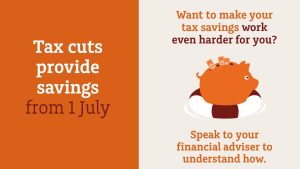HOW MUCH YOU NEED FOR A HOUSE DEPOSIT
A great savings goal for a house deposit is:
20% of the purchase price of the house
plus enough to cover the costs of buying a house
Some lenders only require a 5% deposit. But a smaller deposit means a bigger loan and you’ll have to pay for lenders mortgage insurance (LMI)
A bigger deposit also shows lenders you’re a good saver and able to manage your finances. This can increase your changes of getting approved for a home loan.

LOAN TO VALUE RATIO
The bigger your deposit, the lower your loan to value ratio (LVR). Your LVR is the amount of the loan divided by the purchase price (or appraised value) of the property. For example, if you’re buying a $600,000 house and you have a $450,000 loan, your LVR would be 75%.
The lower your LVR, the less likely you’ll have to pay for LMI. You’re also more likely to get approval for a loan.
LENDERS MORTGAGE INSURANCE
If your LVR is above 80%, you usually have to pay for LMI. This insurance protects the lender if you can’t make the loan repayments and the lender can’t recover the loan balance. LMI protects the lender, not you or a guarantor
You’re charged a one-off fee to cover the cost of LMI. You can pay this fee on settlement or add it to the loan. If you add the LMI fee to your loan, interest will be charged when you repay it.
The average LMI fee is $6,200. But it can be a lot more if you have a low LVR. For more on LMI, see the Understand Insurance website’s frequently asked questions on LMI.
HOW LONG IT TAKES TO SAVE FOR A HOUSE DEPOSIT
Saving for a house deposit does take time and it’s important to be realistic about how long. Nationally, it takes 4.6 years for the average first home buyer couple to save for a 20% house deposit. See how long it could take to save a house deposit where you live.
But by having a savings plan and sticking to it you can reach your savings goal sooner.
Use our savings goal calculator
Use the savings goal calculator to see how long it will take to reach your deposit savings goal.
HELP FOR FIRST HOME BUYERS
If you’re buying your first home, you may be able to get help from the government.
FIRST HOME OWNER GRANT
If you’re a first home buyer or building a new home, you may be eligible for the First Home Owner Grant (FHOG). Different rules apply in each state and territory, but the grant can:
help you pay for your home — you can receive up to $20,000 in some states
reduce how much you pay for land transfer duty (stamp duty)
For more information on the grant in your state or territory visit the first home owner grant website.
FIRST HOME SUPER SAVER SCHEME
The First Home Super Saver Scheme (FHSSS) lets first home buyers save a deposit through their super. You can make up to $15,000 of voluntary super contributions a year that can be withdrawn to buy your first home.
Across all years, the maximum amount you can save in super for the scheme is $30,000 of personal contributions plus earnings.
See first home super saver scheme on the Australian Taxation Office website for more information.
FIRST HOME LOAN DEPOSIT SCHEME
The First Home Loan Deposit Scheme is available from 1 January 2020. It helps eligible first home buyers:
buy a house with a deposit as small as 5% of the purchase price
save around $10,000 in lender’s mortgage insurance (LMI) fees
Visit the National Home Finance and Investment Corporation (NHFIC) website for more information.
TIPS TO SAVE FOR A HOUSE DEPOSIT FASTER
PREPARE A BUDGET
The first step is to get your finances sorted. If you’re planning to buy a house with a partner, do this together.
Do a budget so you can see:
what money is coming in and going out each month
how much you can afford to save regularly for your deposit
where you can cut back
USE A HIGH-INTEREST SAVINGS ACCOUNT
Put your deposit savings into a high-interest savings account or term deposit. You’ll earn a lot more interest compared to a transaction account.
AUTOMATE YOUR SAVINGS
A great way to boost your savings is to transfer money to a savings account as soon as you’re paid. Ask your work to send part of your pay directly to a savings account or set up an automatic transfer from the account your wage is paid into.
Automatic transfers let you ‘set and forget’. You can grow your savings without having to worry about transferring money each pay.
CONSIDER INVESTING
If you plan to buy your house in a few years, you could consider investing. If you’re comfortable with the risk, investing in shares or a managed fund can help grow your savings.
Please contact us on (03) 9562 0742 if you seek further discussion on this topic.
DISCLAIMER
The information/advice provided in this website is General Advice Only. It has been prepared without taking into account any of your individual objectives, financial situation or needs. Before acting on this advice you should consider the appropriateness of the advice, having regard to your own objectives, financial situation and needs. You should obtain a Product Disclosure Statement relating to the products mentioned, and consider the statements before making any decision about whether to acquire products.
We take your privacy seriously and as such we, or any of the Financial Services Partners financial advisers, will never ask you to transfer money via email request unless we have spoken to you in person or the transfer is part of an existing arrangement between you and your financial adviser. If you receive any such requests that are outside the agreed arrangements you have with your financial adviser, please contact our office immediately to confirm the validity the request before you take any action – .







